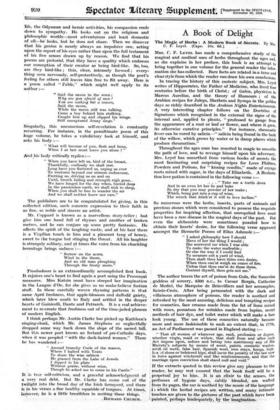A Book of Delight
The Magic of Herbs : A Modern Book of Secrets. By Mrs. C. F. Leyel. (Cape. 10s. 6d.1 MRS. C. F. LEVEL has made a comprehensive study of the magical and medical uses of herbs throughout the ages and, as she explains in her preface, this book is an attempt to bring together in one volume for the general reader the infor- mation she has collected. Bare facts are related in a terse and clear style from which the reader can draw his own conclusions,
In tracing the history of this esoteric subject, Mrs. Leyel writes of Hippocrates, the Father of Medicine, who lived four centuries before the birth of Christ ; of Galen, physician to Marcus Aurelius, and the theory of Humours ; of the Arabian recipes for Juleps, Sherbets and Syrups in the golden days so richly described in the Arabian Nights Entertainments. A very interesting chapter follows on the Doctrine of Signatures which recognized in the external the signs of the internal and, applied to plants, " professed to gauge from the appearance of a root or leaf or flower, and where it grew, its otherwise curative principles." For instance, rheumatic fever can be cured by salicin—" salicin being found in the bark of the willow, which grows by water or in damp places which produce rheumatism."
Throughout the ages man has resorted to magic to smoothe the path of love, and to revenge himself upon his adversary, Mrs. Leyel has unearthed from various books of secrets the most fascinating and surprising recipes for Love Philtres, Powders and Potions, for " kissing comfits," made of eryngo roots mixed with sugar, in the days of Elizabeth. A Restora- tion love potion is contained in the following verse :—
. . . " Take me a turtle dove
And in an oven let her lie and bake So dry that you may powder of her make ; Which, being put into a cup of wine, The wench that drink'st it will to love incline."
So numerous were the herbs, insects, parts of animals and precious stones which were considered to possess the requisite properties for inspiring affection, that unrequited love must have been a rare disease in the magical days of the past. But even the alchemists were sometimes puzzled how to obtain their hearts' desire, for the following verse appeared amongst the Hermetic Poems of Elias Ashmole :-
" I asked philosophy how I should
Have of her the thing I would ;
She answered me when I was able
To make the water malleable ; Or else the way if I could find To measure out a yard of wind, Then shalt thou have thine own desire, When thou can'st weigh an ounce of fire.
Unless that thou can'st do these three,
Content thyself, thou gets not me."
The author traces the art of poison from Gala, the Sumerian goddess of sorcery, 4500 B.c., to Caesar Borgia, Catherine de Medici, the Marquise de Brinvilliers and her accomplice, Sainte-Croix. After being permeated with the dark and villainous atmosphere of poisons, the reader is soothed and refreshed by the most amusing, delicious and tempting recipes for cosmetics, face creams made from the fat of lions mixed with roses, pomatum for wrinkles made from lupins, secret methods of hair dye, and toilet water which will make a face look young. The use of these cosmetics naturally became more and more fashioimble to such an extent that, in 1770, an Act of Parliament was passed in England stating :-
"That all women of whatever age, rank, profession or degree. whether virgin, maid or widow, that shall from and after such Act impose upciii, seduce and betray into matrimony any of His Majesty's subjects by means of scent, paints, cosmetic washes, artifi ial teeth, false hair, Spanish wool, iron stays, hoops, high-
e id shoes or bolstered hips, shall incur the penalty of the law now in force against witchcraft and like misdemeanours, and that the marriage upon conviction shall stand null and void."
If the extracts quoted in this review give any pleasure to the reader, he may rest assured that the book itself will be a perpetual joy to him. It is an elixir to the senses, the perfumes of bygone days, subtly blended, are wafted from its pages, the ear is soothed by the music of the language which the herbal recipes are written, and many intimate touches are given to the pictures of the past which have been painted; perhaps inadequately, by the imagination:






























































 Previous page
Previous page